Despite creating a better position as Black, Ding Liren decided to simplify and entered a riskier endgame where he was on the back foot. With both players on 6.5 points, everything hangs on the final, 14th game of the match
In today’s game, Ian Nepomniachtchi was White. Following a shocking defeat in Round 12 where he lost a winning position, and with just two more games to go, he was under more pressure – to regain his composure and push with white pieces.
Instead of trying to seize the moment and further unsettle Nepomniachtchi, Ding opted for a line well-known by both. In the Closed Ruy Lopez with 6.d3, the two followed the game from round five of the match, which Nepomniachtchi won. It was Nepomniachtchi who decided to deviate from that game on move 10. It was also notable that he played slower in the opening, unlike in other games in this match.

As the two reached the middlegame, Ding was the one who emerged from the opening with a more comfortable position: he stopped White from advancing in the centre, had better-coordinated pieces and had more chances to take the initiative. It seemed that things weren’t going Nepomniachtchi’s way and that Ding was on the path of making a huge break.
However, after a mysterious move placing his rook in the centre, Ding started losing his way. As in previous games, he was falling behind on the clock and his choice of moves wasn’t the best. In a sharp position, Ding decided to simplify – he gave up a rook for a bishop and a pawn and exchanged the queens. Black had enough compensation, but he completely squandered the advantage. After a few more imprecise moves by Ding, the tables turned completely: the two reached an endgame where White was playing for a win, while Black had to be precise in defending.

White was pressing, but neither side gave way. Just after three hours of play and 39 moves, the game ended in a draw.
Everything now hangs on the final, 14th game of the match. If either side wins, they will take the crown. If it’s a draw, the World Championship match will go into tiebreaks.
Friday will be the final rest day for both sides. Game 14 will take place on Saturday, 29th April at 3 PM Astana time.
Here follows a closer look at Game 13 of the match.

After a rollercoaster ride in Game 12, both Ian Nepomniachtchi and Ding Liren are teetering on the edge of their physical and mental limits. With just two rounds left and the score level, there is no time to take it slow.
Nepo seemed to be in a more difficult position ahead of today’s round: he had a huge shock in yesterday’s game where he was on the brink of winning the title of World Champion, only to throw it all away in just one move. Today he was playing with white pieces and – with this being one of the final two games – he had to push which, after suffering a devastating defeat, is difficult. Ding seemed to be more at ease as game 13 started.
1.e4 Nepomniachtchi stuck to his main opening move.
1…e5 2.Nf3 Nc6 3.Bb5 a6 4.Ba4 Nf6 This line of the Ruy Lopez was played in the match twice so far. Grandmaster Daniil Dubov noted that “from the psychological point of view I don’t like this for Ding at all”, suggesting he should have used this opportunity to do more to destabilize Nepomniachtchi with a surprise given that he is in “a shaky state”.
5.0-0 Be7 6.d3 b5 7.Bb3 d6 8.c3 0-0 9.h3 Bb7
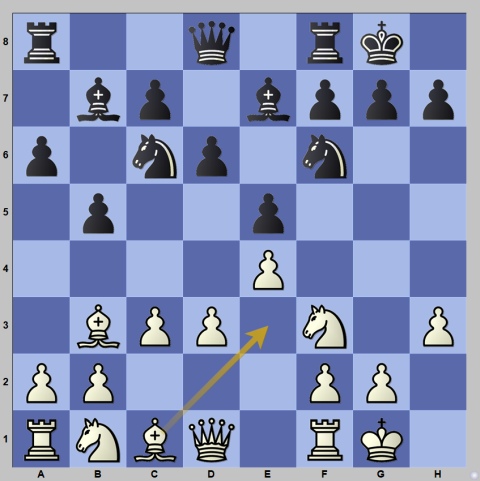
Up to this point, the two were following game five of the match which Nepo won as White. Here Nepomniachtchi opted for 10.Be3, instead of 10.a4 as in game five. This is a new move at the elite level, but the first time this was played was in 1977 in an amateur game.
Former World Champion Vishy Anand made the following comment: “Nepo being very sensible, his White openings have worked well, so why deviate? Ding playing very natural moves as well. He doesn’t need to keep provoking today.”
Following a series of natural moves Ian decided to break through in the centre but missed an important subtlety.
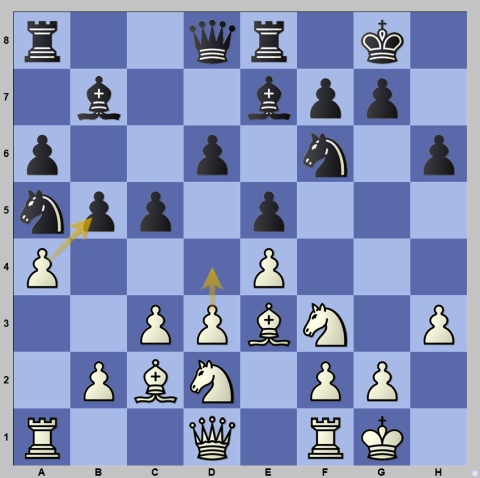
14.d4 Nepo spent 14 minutes thinking before this move. It was suggested by Grandmaster Robert Hess that, in the long run, White made the mistake of not taking axb5 first as that would open the a-file and the a4-square for his bishop. This decision might come back to haunt White, it was suggested.
14…exd4 15.cxd4 cxd4 Playing 15…c4 despite looking as threatening (with the idea of playing c3) is actually dangerous as White would take on b5, open the file for a rook attack on the knight and press with d5, leaving Black’s pieces hanging and in a risky position. Still, Ding paused here for eight minutes to reassess the situation. “A smart strategical choice”, noted Fabiano Caruana.
16.Nxd4 Nc4! An excellent move by Ding forcing an exchange of knights, with the idea of making it harder for White to defend the e4-pawn.
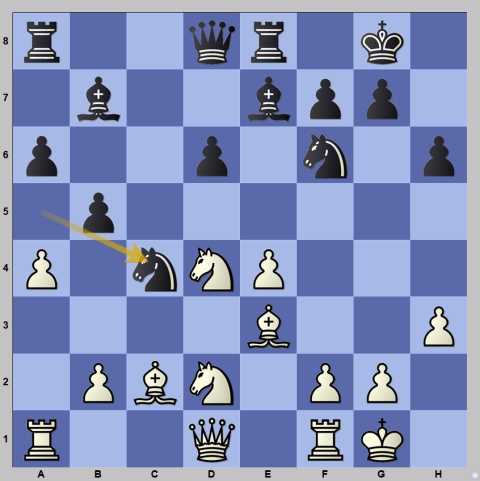
17.Nxc4 bxc4 and White switched to defense with 18.f3 but after 18…Bf8 Black got an edge. Ding has a strong grip on the centre and better coordination of his pieces.
19.Bf2 d5 It is time to push in the centre.
20.exd5 Nxd5 21.Be4 Gradually, White ended up on the back foot. “He hates this position, I can see it on his face”, commented GM Irina Krush analysing Nepomniachtchi’s body language.
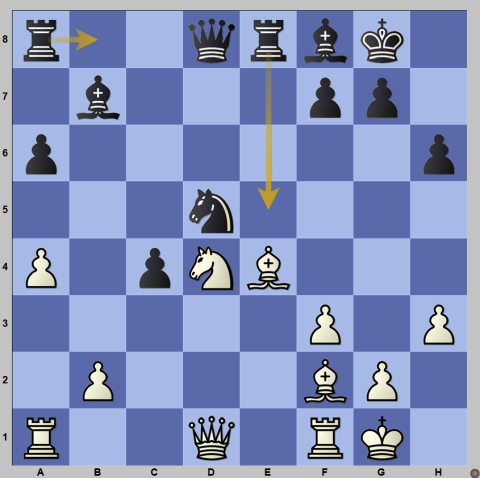
This was a critical point and Ding got into a long think here. “He is trying to be accurate. Ian is on the back foot. Ding recognises that he needs to find forward-looking moves. He knows he’s better and he needs to be very precise here,” said Grandmaster Robert Hess.
21…Re5?! Played after 25 minutes. However, this ambitious move seems to be premature. After natural 21…Rb8! White would have been virtually forced to take on d5 giving Black two-bishop advantage and defending an inferior position.
When Black’s 21st move was made, Nepo seemed surprised.
22.Rc1 Quickly played by Ian. 22…Rc8, Ding immediately fired back.
23.Ne2 The computer did not like this move, saying that now Black is slightly better. Instead, it suggested playing 23.Qd2, 23.Rc2 or putting the knight to f5. With the knight on e2, however, White is focusing on his defence, countering Black’s idea of getting the knight to f4, and opening the path for the f2-bishop.
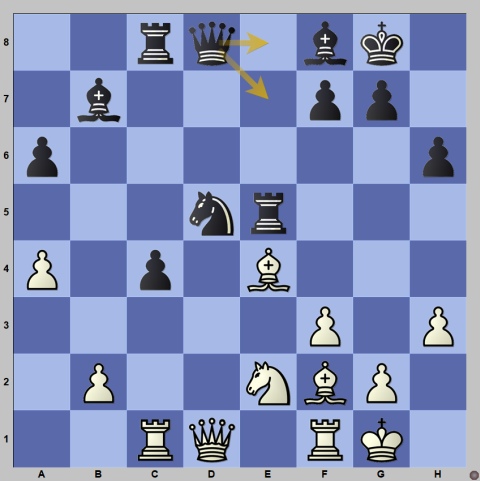
23…Qe7 another inaccuracy by Ding as the evaluation bar now erased Black’s advantage. With the queen on e7 Black is running the risk of getting pinned on the h2-b8 diagonal with White’s black-squared bishop.
The computer was suggesting 23…Qe8 instead. With that move the f8-bishop is still active and has a chance to jump to c5. If 24.Re1 Rd8 25.Nd4 Bb4 and White’s position is challenging. If 24.Bd4 Ne3!! 25.Bxe3 Bxe4 26.fxe4 Rxe4 and now Black regains a piece as two heavy pieces are hanging on the e-file, ending up with a pawn advantage and a better position. Ding, however, missed this line.
24.Qd4 Ian immediately jumped at the opportunity. With Black’s queen blocking the dark-squared bishop, this move works perfectly.

24…f5 bravely played by Ding, going for a positional exchange sacrifice. “Black may well have enough compensation, but is he better? I don’t think so. Why did Ding go down this road at all?”, asked Vishy Anand on Twitter.
25.Bg3 Rxe4 Played instantly by Ding. Black had a different, slightly better version of an exchange sacrifice, namely 25…fxe4.
26.fxe4 Qxe4 27.Qxe4 fxe4 Black has a pawn for the exchange and a strong knight in the centre. Ding thinks this is enough compensation. However, it’s clear Black squandered the advantage he had a few moves earlier.
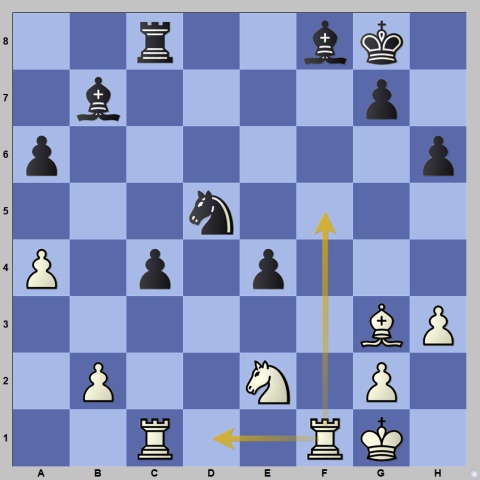
28.Rfd1 White wants to get his rook to d7 and c7 and exchange it for Black’s remaining rook, although 28.Rf5 might have been a bit stronger.
28…Nb4 Black’s king is heading to d3 but this move allowed Ian to jump to seventh rank with 29.Rd7 And now the roles have reversed: White gets to play for a win while Black has to defend accurately.
Eventually, White did not manage to find a way to make progress and the two agreed on a draw in an equal position.
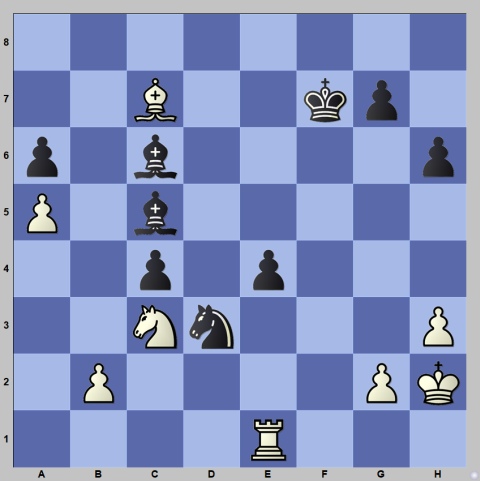
In the post-game interview, Nepomniachtchi said that he “didn’t really like his position” and that he went into a “passive defence”.
“Today I just came to play chess, it wasn’t great but I tried”, said Nepo when asked about how he recovered following the abrupt loss in game 12.
Commenting on Ding’s move 21…Re5, Nepomniachtchi called it “artificial”, noting better options for Black.

Commenting on the mysterious 21…Re5 move, Ding said: “My first intention was to play the rook to b8, but he would take on d5 and if I take with the bishop he could play the queen to d2 to protect the pawn. I didn’t see a way to push for the advantage… The idea with 21…Re5 was to try and protect the knight with the rook, but that move also has some drawbacks.”
Ding was asked about how he felt playing as White in the last game of the match: “It’s both an advantage and a disadvantage,” Ding replied.
An interesting moment occurred in the press conference when Nepomniachtchi was asked whether he is superstitious about the choice of clothes he wears. “Does it matter… I’ll skip this question”, he said, suggesting that there is something there.

Given the outcome of the opening and what happened in game 12, today’s result and a relatively short game meant that Nepomniachtchi got a respite. Making a draw with Black and creating more advantage from the opening was a boost for Ding. Both will have one more shot on Saturday. Everything hangs on game 14 which will be played on Saturday, 29th April.
Text: Milan Dinic
Photo: Steve Bonhage, Anna Shtourman and David Llada
Official website: worldchampionship.fide.com/
About the match
The 2023 FIDE World Chess Championship match between Grandmasters Ding Liren and Ian Nepomniachtchi takes place from 7th April to 1st May 2023 in Astana, Kazakhstan.
The match consists of 14 games, followed by a rapid/blitz tiebreak in case of a tie.
The time control for the standard games is 120 minutes for the first 40 moves, followed by 60 minutes for the next 20 moves, and then 15 minutes for the rest of the game, with an increment of 30 seconds per move starting from move 61.
The first player to reach 7,5 points in the 14 games will win the match. If it’s a tie, the two go to tiebreaks.
The prize fund for the match is two million euros, with the reward being split 60:40 between the winner and the runner-up.


